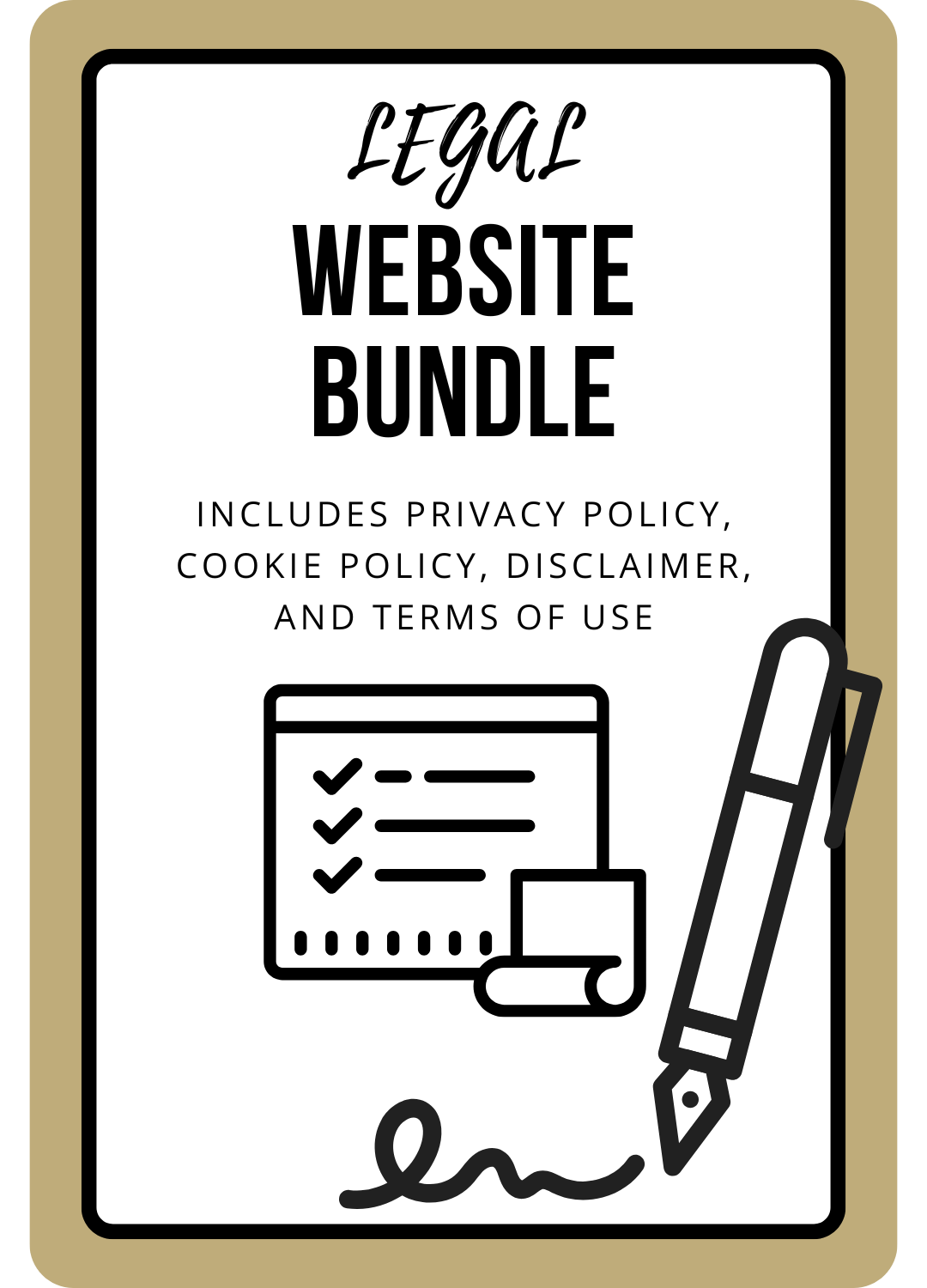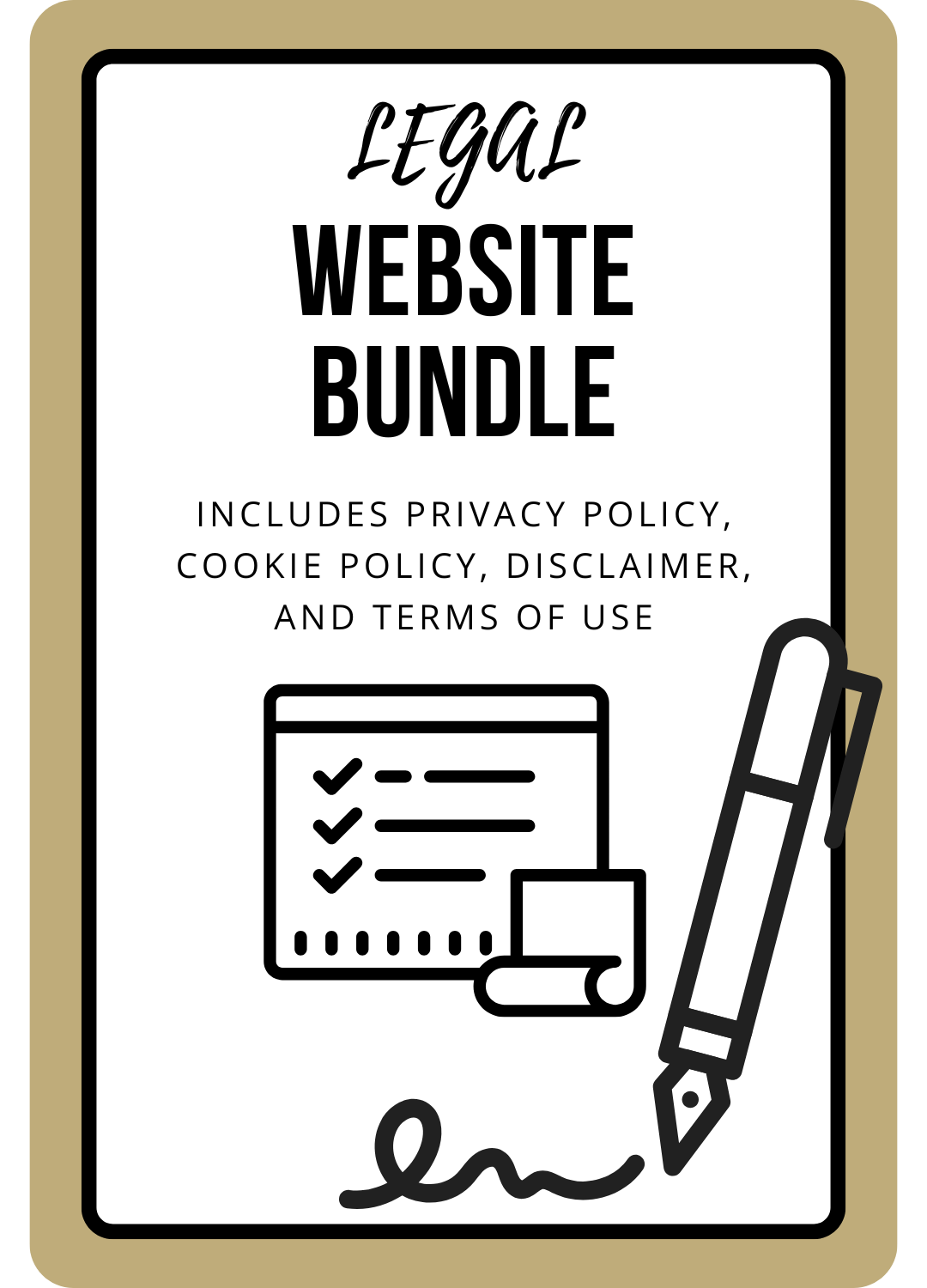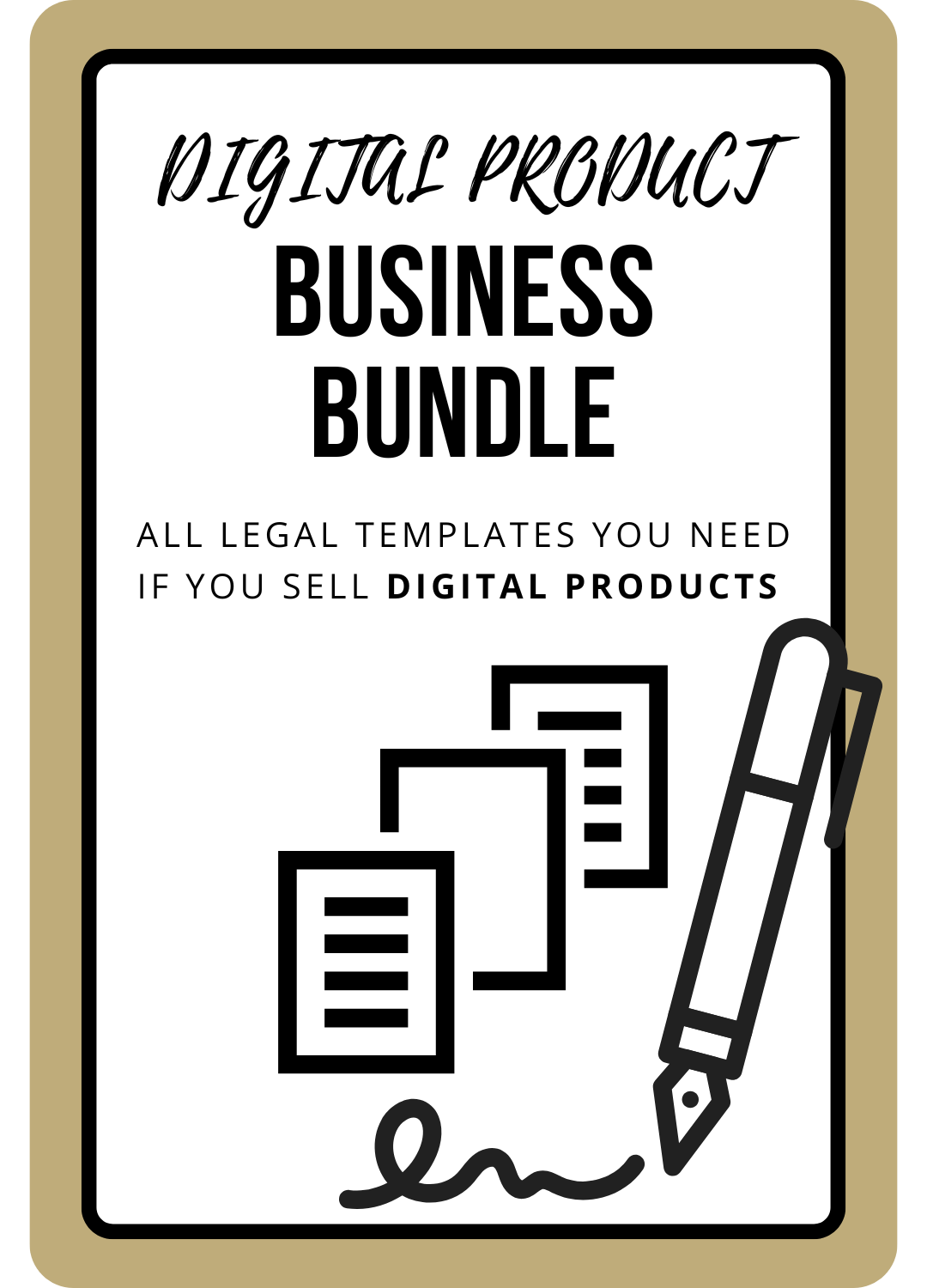7 Essentials Your Website Terms of Use and Privacy Policy Generator Won’t Cover (But You Need to Stay Protected)
Can a website terms of use and privacy policy generator really protect you? Not quite. Most free samples and generators — like Termly, TermsFeed, or RocketLawyer — leave out key clauses that put you at risk.
As a lawyer for online entrepreneurs and creators like you, I’ve seen too many people rely on cookie-cutter generators only to find themselves unprotected when legal issues come up. These generic tools spit out bare-minimum website terms of use and privacy policy templates, but they don’t cover the real-world risks of running an online business.
That’s why in this post, I’ll walk you through 7 essentials your website terms of use and privacy policy must have (that most free samples or generators simply don’t include).
You’ll see exactly what a generic website terms of use and privacy policy template is missing, and how a simple website terms of use and privacy policy won’t help you — and how to fix it with ready-to-use pages written for online businesses like yours.
👉 Get all these essentials in a done-for-you website terms of use and privacy policy, plus the crucial Disclaimer Page inside my Legal Website Bundle.
This post is all about what’s missing in a generic website terms of use and privacy policy, why it matters, and how to fix it with ironclad legal pages.
Best Website Terms of Use and Privacy Policy
The 7 Essentials Every Website terms of use and privacy policy template Should (But Often Won’t) Have
1. Global Privacy Law Coverage
Most free website terms of use and privacy policy generators promise GDPR and CCPA compliance. Some even claim to cover all state privacy laws.
But here’s the problem:
They usually apply a basic website terms of use and privacy policy sample with generic rules to all visitors.
They don’t explain which rights apply to EU residents versus California residents versus Virginia residents.
That leaves you exposed, because privacy rights differ depending on where your users live.
My Privacy Policy template solves this by spelling it out clearly. It has separate sections for:
EU/UK residents under the GDPR
California residents under the CCPA
Other U.S. states with their own privacy laws (Colorado, Virginia, Connecticut, Utah, and more)
That means your visitors know exactly what applies to them — and you’re not making false promises that could backfire.
Here’s just one privacy policy example to demonstrate how this can negatively affect you: A customer in Virginia requests to opt out of profiling. If your policy only states that “all users can access, correct, or delete their data,” you’re missing this state-specific right — and you may be non-compliant.
👉 Already pre-written in the terms and privacy policy included in my Legal Website Bundle. Just customize your details, and you’re compliant in minutes.
2. Protecting Your IP — and Securing Rights to User Content
Most free website terms of use and privacy policy templates only say: “All content on this website is owned by us.” That protects your blog posts and graphics — but it ignores the content your users might submit.
Think about:
Testimonials and reviews
Comments and feedback
Photos, videos, or text uploaded by users
Submissions for giveaways, challenges, or collaborations
If the terms of use for a website don’t cover user-generated content (UGC), you don’t have the right to legally reuse it in your marketing or products. Generators almost never include this protection.
My website terms of use and privacy policy template closes this gap. It:
Protects your content from being copied or misused
Sets rules for user submissions (UGC)
Grants you a license to use, publish, and adapt that content in your business
Makes these rights legally binding — because users must agree to your terms (via a checkbox) before submitting anything through your form (“I accept terms of use and privacy policy of the website”)
Example: Let’s say you run a fitness coaching website. A client uploads a progress photo through your website form. If you don’t have the right clause — and proof they agreed to it — you can’t legally reuse that photo on your course sales page or social media.
My policies and terms make it clear you have full rights.
👉 All pre-written in the Legal Website Bundle — so your IP and user submissions are protected.
3. Tailored Disclaimers for Your Niche
Most free website terms of use and privacy policy samples include a one-liner: “We are not liable for any errors.” That’s vague — and useless when it comes to the specific risks of your business.
What you need, besides the website terms of use and privacy policy, is a disclaimer page.
Your disclaimer page should include disclaimers that are tailored to your niche. For example:
Coaches must clarify that they don’t provide therapy, medical, or financial advice.
Health and fitness creators must state that workouts, diets, or supplements are not a substitute for professional guidance.
Food bloggers need disclaimers about allergies and recipe outcomes.
DIY or craft businesses must warn users to follow instructions at their own risk.
Business and marketing professionals need disclaimers that results are not guaranteed (so clients can’t claim you “promised” revenue or growth).
Disclaimers covering earnings claims (so you’re not accused of false promises)
My disclaimer template (an additional template in my Legal Website Bundle) covers all of this. It includes ready-to-use clauses for dozens of niches — coaching, medical, fitness, finance, mental health, recipes, DIY, supplements, and more.
That way, you’re not stuck with a generic “use at your own risk” statement that leaves you exposed to liability risks in your niche.
Example: You post a workout guide. A follower pulls a muscle and blames your instructions. With only a vague liability disclaimer, you could be at risk. With my tailored disclaimers, it’s crystal clear you’re not responsible for their personal results.
👉 The Legal Website Bundle is the only package that gives you not just a terms of use and privacy policy template — but a comprehensive disclaimer tailored to your niche.
4. Affiliate & Sponsorship Disclosures (Legally Required)
Here’s something most website terms of use and privacy policy generators completely miss: affiliate and sponsorship disclosures.
If you use affiliate links, publish sponsored posts, or share paid reviews, the law requires you to disclose that relationship. In the U.S., the FTC has strict guidelines. In the EU, similar consumer protection laws apply. Skipping these disclosures isn’t just sloppy — it can put you at risk of fines or complaints.
My disclaimer template takes care of this by including:
Clear affiliate link disclosures (so visitors know you earn a commission)
Rules for sponsored content and reviews
Clauses covering earnings claims (so you’re not accused of false promises)
These protections don’t appear in a generic free website terms of use and privacy policy because they’re focused only on privacy basics.
However, if you use just one affiliate link and earn even a few cents, or if you’re paid to promote something on your site, these disclaimers are non-negotiable.
Example: You write a blog post reviewing your favorite software and include an affiliate link. Without a clear disclosure, you could be violating FTC rules — and lose your affiliate partnership. With my template, the disclosure is built right in.
👉 Included in the Legal Website Bundle — so you’re compliant and protected from day one.
Protect Your Website the Smart Way
Free samples and generators only scratch the surface. My Legal Website Bundle gives you:
A detailed Privacy Policy that actually specifies which rights apply to which users
Website Terms & Conditions that protect your content and your right to use user submissions
A comprehensive Disclaimer Page with niche-specific disclaimers, affiliate disclosures, and more
👉 Get all three pages pre-written, professionally drafted, and easy to customize inside the Legal Website Bundle.
5. Website Use Rules & Termination Rights
Most free website terms of use samples toss in one vague line: “Don’t misuse the website.” That’s not enough.
Your website needs clear rules that tell visitors what’s off-limits. My Website Terms and Conditions template spells this out, including:
No malware, viruses, or hacking attempts
No scraping, bots, or data-mining tools
No spamming, chain letters, or unsolicited commercial messages
Equally important, you need the right to suspend or terminate access if someone breaks those rules. Without that clause, you could end up stuck with repeat offenders, trolls, or even data thieves who claim you had no right to block them.
Example: A visitor uses a scraping tool to copy all your blog content. With a generic free policy, you’d have little ground to shut them out. My Terms make it clear you can revoke access immediately.
👉 All included in the Legal Website Bundle — so you’re protected against misuse from day one.
6. Dispute Resolution & Governing Law
Most website terms of use and privacy policy sample generators make you pick one option: either disputes go to your local court, or they go to arbitration. That sounds simple — but it’s not always the best choice.
Here’s the problem:
Court decisions are cheaper and quicker if the other party is in your country — but hard (sometimes impossible) to enforce abroad.
Arbitration is more expensive upfront — but arbitral awards are enforceable in most countries worldwide, making them far more effective for international disputes.
My website terms of use and privacy policy give you the best of both worlds:
Domestic disputes → handled in your local courts (faster and cheaper)
International disputes → handled through arbitration, so the outcome is enforceable across borders
Special EU note → if you’re in the EU, you can choose “a Member State of the European Union,” since EU court decisions are automatically enforceable across Member States.
Example: Someone in another country sues you locally. With a generic free policy, you may be forced to defend yourself abroad. With my website terms of use and privacy policy template, you won’t need to leave your country — saving you time, money, and stress.
👉 This smart dispute resolution setup is built into the website terms of use and privacy policy template in my Legal Website Bundle — so you’re protected both at home and internationally.
7. Age Restrictions & Parental Consent
Most free website terms of use and privacy policy generators say nothing about age limits. That’s a big risk.
Collecting data from children is heavily regulated. In the U.S., the COPPA law prohibits collecting personal information from kids under 13 without parental consent. Similar protections exist in other countries. If your website doesn’t clearly state this, you could be seen as non-compliant.
My Terms and Privacy Policy includes:
A clear statement that your site is intended for adults
A prohibition on data collection from children under 13
Rules requiring parental or guardian consent for users under 18
This makes it clear to both parents and regulators that your site isn’t designed for minors — and that you’re taking the right precautions.
Example: A 12-year-old signs up for your newsletter. If your privacy policy doesn’t mention age restrictions, you could be accused of illegally collecting their data. My website terms of use and privacy policy template blocks this risk upfront.
👉 Already built into the Legal Website Bundle — so you don’t need to worry about hidden compliance traps.
The Ultimate Legal Website Bundle (Including a Terms of Use and Privacy Policy Template & More)
Free website terms of use and privacy policy generators look convenient — but they leave out the essentials. From global privacy laws to niche disclaimers, affiliate disclosures, and age restrictions, these are the clauses that actually keep your business safe.
With my Legal Website Bundle, you get more than just a basic website terms of use and privacy policy template. You also get a comprehensive Disclaimer Page — something most people don’t even realize they need until it’s too late.
Here’s what you get inside:
A Privacy Policy that specifies which rights apply to which users (GDPR, CCPA, and more)
Website Terms & Conditions that protect your IP and your rights to user submissions
A Disclaimer Page with niche-specific disclaimers and affiliate/sponsorship disclosures
👉 Get the Legal Website Bundle today and protect your website with professionally drafted pages — instead of relying on cookie-cutter generators.
Selling Digital Products or Courses Too? (You Need More Than Just the Terms and Privacy Policy)
Your website legal pages are the foundation — but if you also sell digital downloads, eBooks, or online courses, you need more than just the website terms of use and privacy policy.
That’s where my Digital Product Business Bundle comes in. It includes the full Legal Website Bundle plus:
Terms & Conditions for Digital Products — protect your downloads from copycats and refund demands
Terms & Conditions for Online Courses — set clear rules for students, content protection, and refund policies
Affiliate Terms & Conditions (Pro version only) — control how affiliates promote your products
Testimonial Release Form (Pro version only) — get legal permission to use client feedback in your marketing
👉 Get the Digital Product Business Bundle and cover everything from your website to your digital products — with one complete set of contracts.
This post was all about the 7 essentials your website terms of use and privacy policy must include to keep your online business protected.
Other posts you may like:








